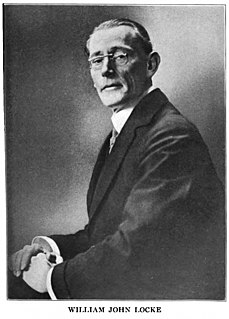A Quote by William John Locke
Have you ever considered what anxious thought, what consummate knowledge of human nature, what dearly-bought experiences go into the making of an advertisement?
Related Quotes
Anthroposophy is a path of knowledge, to guide the spiritual in the human being to the spiritual in the universe... Anthroposophists are those who experience, as an essential need of life, certain questions on the nature of the human being and the universe, just as one experiences hunger and thirst.
Everyone recognizes a distinction between knowledge and wisdom. . . Wisdom is a kind of knowledge. It is knowledge of the nature, career, and consequences of human values. Since these cannot be separated from the human organism and the social scene, the moral ways of man cannot be understood without knowledge of the ways of things and institutions.
Every man that ever lived craved perfect happiness, the detective poignantly reflected. But how can we have it when we know we’re going to die? Each joy was clouded by the knowledge it would end. And so nature had implanted in us a desire for something unattainable? No. It couldn’t be. It makes no sense. Every other striving implanted by nature had a corresponding object that wasn’t a phantom. Why this exception? the detective reasoned. It was nature making hunger when there wasn’t any food. We continue. We go on. Thus death proved life.
The most heterogeneous ideas are yoked by violence together; nature and art are ransacked for illustrations, comparisons, and allusions; their learning instructs, and their subtlety surprises; but the reader commonly thinks his improvement dearly bought and, though he sometimes admires, is seldom pleased.
Mind is the great lever of all things; human thought is the process by which human ends are ultimately answered; and the diffusion of knowledge, so astonishing in the last half-century, has rendered innumerable minds, variously gifted by nature, competent to be competitors or fellow-workers on the theatre of intellectual operation.
It is due to justice; due to humanity; due to truth; due to the sympathies of our nature; in fine, to our character as a people, both abroad and at home, that they should be considered, as much as possible, in the light of human beings, and not as mere property. As such, they are acted on by our laws, and have an interest in our laws. They may be considered as making a part, though a degraded part, of the families to which they belong.
Surely knowledge of the natural world, knowledge of the human condition, knowledge of the nature and dynamics of society, knowledge of the past so that one may use it in experiencing the present and aspiring to the future--all of these, it would seem reasonable to suppose, are essential to an educated man. To these must be added another--knowledge of the products of our artistic heritage that mark the history of our esthetic wonder and delight.
The only thing that one really knows about human nature is that it changes. Change is the one quality we can predicate of it. The systems that fail are those that rely on the permanency of human nature, and not on its growth and development. The error of Louis XIV was that he thought human nature would always be the same. The result of his error was the French Revolution. It was an admirable result.







































